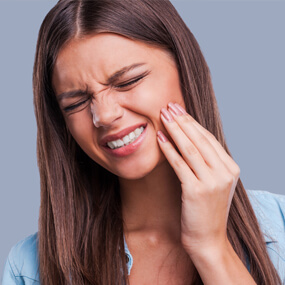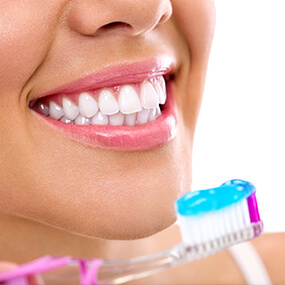The Benefit of Probiotics to Your Oral Health

Probiotics are living microorganisms that have gained a great deal of attention in recent years due to how they restore and enhance gastrointestinal microbiota, which aids in digestion and helps to avoid many symptoms often associated with digestive problems. What you may not know is that certain probiotics have been linked to improved oral health. Research has shown that these probiotics restore and enhance oral microbiota, and a balanced oral microbiome helps to maintain fresh breath, inhibit the growth of dental plaque, and aid in avoiding both tooth decay and gum disease.
Oral Microbiota
The gastrointestinal microbiome receives a great deal of attention not just for the role it plays in digestion but in health overall. The oral microbiome, however, may not be getting enough attention. After all, its microbiota is second in size and scope only to the gut microbiota. Your mouth serves as a gateway to the rest of your body and plays its own crucial role not just with digestion but with your immune system. In addition, you actually swallow the microorganisms in your mouth, which means that your oral microbiota is integral to shaping the gut microbiota by inoculating it and reseeding it.
It is unsurprising, therefore, that your oral health can have a dramatic impact on your systemic health. If the mouth is healthy, harmful bacteria will be destroyed there, but if the mouth is not healthy, that bad bacteria can exacerbate the situation in the mouth and make it to other parts of your body as well. Imbalances in the mouth can lead to bad breath, tooth decay, gum disease, and oral thrush. According to a 2019 study published in the Journal of Oral Microbiology, the bacteria that reaches the gut microbiome can alter responses from the immune system and even lead to systemic diseases. There are numerous diseases linked to oral bacteria, including cancer, cardiovascular disease, and dementia.
The Oral Health Benefits of Probiotics
The mouth has been called the window to overall health, and it is clear that the implications of healthy teeth and gums extend far beyond just oral health. Maintaining a well-balanced oral microbiome is important to systemic well-being, and probiotics can help you achieve that. With that in mind, let us consider some of the known benefits of probiotics based on research that has been conducted.
Avoids Halitosis
Multiple studies have focused on whether probiotics can suppress bad breath. Bad breath is usually caused by bacteria in the mouth or gut or gases that are emitted as you exhale. In one notable study, subjects used an antimicrobial oral rinse and then were given either a placebo or a probiotic supplement. The study concluded that more than 80 percent of subjects who received the probiotic supplement experienced a significant reduction in the oral bacteria that causes bad breath.
Fighting bad breath successfully often comes down to consistent oral care and remaining well-hydrated so that your mouth is not dry. You may also consider taking an oral probiotic supplement to help safeguard against bad breath further. It is preferable to overusing an antibacterial mouthwash, which may work in the short-term but can actually destroy beneficial bacteria and make matters worse.
Inhibits Plaque Accumulation
Some of the bacteria in your mouth interacts with food particles and acids to create dental plaque. Plaque is a substance that sticks to and builds up on oral surfaces, and it is the leading cause of tooth decay and periodontal disease. Chief among these bacteria is Streptococcus mutans. S. mutans not only assists in the formation of plaque, but it adheres to it and produces acids over time. In studies where the probiotic A12 was cultured alongside S. mutans, the A12 inhibited the growth of the S. mutans.
Helps to Avoid Tooth Decay
Probiotics certainly help to avoid tooth decay by reducing the presence of acids that attack your tooth enamel and eventually lead to cavities. However, in a 2001 study, nearly 600 children age 6 and younger were given milk that contained oral probiotics over a period of seven months. The milk not only reduced the presence of S. mutans but decreased the risk of cavities by a greater degree than expected. Other studies have achieved similar results and shown not only reduced levels of S. mutans but obstruction of its ability to stick to plaque and more neutral pH levels in the mouth overall.
Reduces Inflammation Associated With Gum Disease
A 2006 research project began with the theory that oral probiotics could reduce the symptoms of gingivitis, which is the earliest stage of gum disease. This includes gums that are red, swollen, sensitive, inflamed, and inclined to bleed. The subjects in this group were given either a placebo or a probiotic. At the end of the research period, symptoms improved in those that got the probiotic, and systems improved to a greater degree among those who had received the highest dosages of the probiotic.
Another study demonstrated that probiotics reduced the inflammation associated with gum disease, and a 2007 study showed improvement specifically with the probiotic Lactobacillus brevis. In another study, the entire group had their teeth cleaned using a deep scaling process. Half the group was given a placebo, and the other half was given probiotic lozenges to use until the next cleaning. At the end of the period, the people using the lozenges had cleaner teeth and better oral health overall.
May Aid in Oral Cancer Prevention
A 2013 research project found that the probiotic Lactobacillus salivarius lowered the risk of oral cancer in rats, and subsequent studies based on this work are underway. Science does recognize that certain oral pathogenic bacteria are biomarkers that can indicate oral and some other cancers. It is believed that we can identify cancers and other diseases through saliva testing as well as adjust the saliva to minimize the effects of certain diseases, and there are currently studies underway toward that end.
May Aid in the Prevention of Cardiovascular Diseases
A wide range of studies have demonstrated that people with gum disease and other oral health issues are more prone to heart failure and other cardiovascular diseases. The Archives of Medical Science published a notable study that showed that oral infections can directly contribute to strokes and heart attacks. The data gathered in that study indicated that perhaps 50 percent of all heart attacks were related to oral infection, and the researchers recommended adding periodontal disease as a risk factor for atherosclerosis, which is a disease of the arteries caused by a buildup of fatty materials.
Research projects like those discussed above have motivated some dentists to include oral pathogen testing in their regular exams as a preventive measure. There are many diseases in which dentists are integral in diagnosing early through screening, and this could be another way they do that. There is ample evidence that the relationship between cardiovascular disease and oral pathogens is quite strong. Doctors have found the previously mentioned S. mutans in the hearts of patients with heart disease and also Porphyromonas gingivalis, which is associated with gum disease, as well as Aggregatibacter actinomycetemcomitans, Treponema denticola, and Streptococcus sanguinis. Oral probiotics could make a difference in helping crowd out these bacteria, but much research remains in that regard.
How Probiotics Work
Probiotics work in a number of different ways but are notable due to how they interfere with pathogens, which are microbes that cause infections. One way probiotics do this is through boosting the immune system, which makes it more difficult for pathogens to bind with the various tissues in your body. Probiotics also produce agents that make the environment more inhospitable to these pathogens, and in some cases, the probiotics directly inhibit the growth of the pathogen or even destroy it outright. Probiotics also have characteristics that reduce inflammatory responses. They also stimulate bone development, and it may be possible for probiotics to repair the bone deterioration that can occur due to advanced gum disease.
Is There a Difference Between Regular Probiotics and Oral Probiotics?
Yes. Probiotics is a broad term that encompasses many different living microorganisms. When people discuss probiotics, they are often talking about microorganisms found in the gut. This is the kind of probiotics found in some yogurts and sauerkraut, and supplements that are just generically labeled probiotics often contain various bacterial strains that are native to your gut.
Regular probiotics can be found in foods or taking as a supplement in capsule form. The capsule itself is often specially formulated to survive the acidic nature of your digestion system so that probiotics can get deeper into the system. In addition to choosing a product with a high count of colony-forming units—CFUs—it is also important to select a high-grade product with a strong capsule.
Oral probiotics, on the other hand, contain strains that are native or beneficial to the oral microbiome. There is often some overlap with standard probiotics, but the focus is on the mouth. Rather than as capsules to be swallowed, oral probiotics are often sold as lozenges or chewables. They are meant to be in the mouth for an extended period and until they completely dissolve. This ensures that enough time has passed for these probiotics to inoculate the oral microbiota.
Which Bacterial Strains Are Best for the Oral Microbiome?
It is worth mentioning that the research into oral probiotics is still in the early stages. That said, a number of probiotic strains have been identified that boost oral health. These include the Streptococcus and Lactobacillus probiotic strains, which have been identified for their ability to inhibit plaque, and Streptococcus, in particular, is recognized for its ability to suppress odor-causing bacteria.
Choosing an oral probiotic is similar to a regular probiotic in that you want to select a high CFU count. However, be mindful that regular probiotics will typically have a higher CFU and strain count. You need to compare oral probiotics to other oral probiotics rather than regular probiotics. You should also look specifically for known beneficial strains, such as S. salivarius M18 and S. salivarius K12.
Something else to consider is that you should not focus on a particular stain exclusively. Many, if not most, products on the market strive to reflect a wide range of stains. This kind of diversity is better for your oral health as well as your overall health rather than focusing specifically on those mentioned above.
Your Sources for Probiotics: Dietary and Supplemental
Supplements are a great way to ensure that you are not deficient, but nature provides many foods that also introduce these probiotics to your body. You should balance your diet to ensure that probiotics are well-represented but also prebiotics. Prebiotics are foods that promote the growth and stability of good gut flora. Some of the most popular probiotic foods include aged cheese, buttermilk, cultured cottage cheese, and yogurt, and there are non-dairy options too like kimchi, kombucha, and sauerkraut. Prebiotic foods include chicory root, dandelion greens, raw oats, unrefined barley, and unrefined wheat.
Oral Health and a Well-Balanced Diet
A well-balanced diet is crucial to your oral health and your systemic health. That includes probiotics, oral probiotics, and prebiotics to ensure balanced gut and oral microbiomes. You can also boost the health of your teeth and gums by emphasizing foods that are good for them while avoiding those that are not. The importance of consistent oral hygiene cannot be overstated either. If your oral health suffers due to poor oral hygiene, no aspect of your diet, including probiotics, will be able to overcome that.
Embrace Probiotics for Oral Health and Overall Health
Probiotics can provide many health benefits, including helping to avoid cavities and gum disease. You can add probiotics to your diet through supplements but also the foods you eat. Of course, a good diet does not alleviate the need to practice good oral care at home and see your dentist on a regular basis. Jeffrey D. Clark, DDS, can help keep your mouth healthy while providing advice about probiotics and other aspects of your diet. Call Scottsdale Cosmetic Dentistry Excellence at 480 585 1853 to schedule your next checkup.




